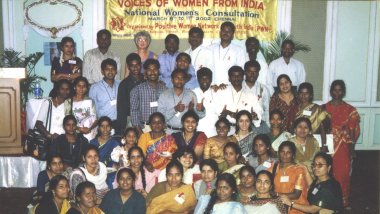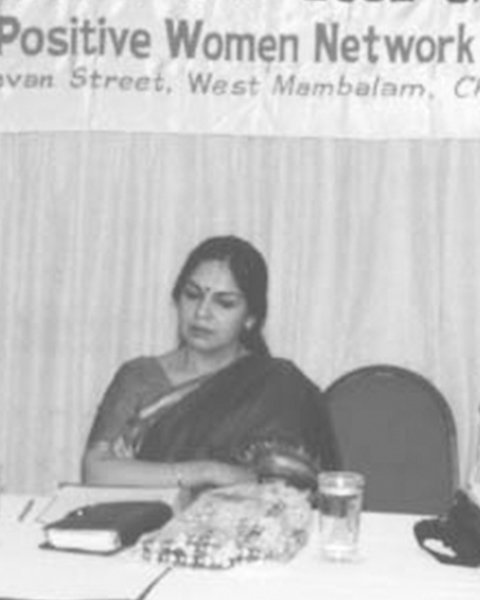The coming of HIV
Twenty years ago, from diverse backgrounds and places, four women had come forth together to rebuild their life bravely and dashingly after it caught in the turmoil of an unexpected turn over caused by a strange intruder named HIV/AIDS. P. Kousalya, Varalakshmi, Jones and Hema, the founders of PWN+ once had a nondescript life in almost all sense as it flowed normally in a conformist structure of patriarchy in Indian context; they were homebound and traditional as ever. However, the so called security-embedded, home (men) dictated arranged marriages were turned out to be disastrous for them, through their conjugal relationship HIV affected them and thus AIDS came home. At once, all things had gone awry in a topsy-turvy manner and their comfort zone home became a war zone instantly. Each of these women has a distinctively different story to tell brimmed with tragedy and injustice, stigma and discrimination from family and society.
The Face of Resistance
Events took a different turn when Kousalya came to know her husband’s HIV status, instead of retreating into gloom; she stepped out of her embarrassing situation to meet the challenges ahead. Her in-laws had known her husband’s HIV status before the marriage; although, they hid the fact from her. As becoming a widow just after a seven month’s period of marriage and visibly distracted on the treatment meted out her in-laws, Kousalya began her long-standing struggle to get the rightful share of the property she duly deserved. She explored every avenue that includes complaint to police, official authorities and legal measures which would eventually resulted in disclosing her HIV status to the public. Through this struggle and other related activities Kousalya came to know about the cases similar to hers devalued and discriminated against because of their HIV status. Ever since that she determined to do something for the women suffering from HIV/AIDS. The four women met at a program organized by the National AIDS Control Organization (NACO), in Chennai, 1997. During their course of interaction with each other, they became aware about the ground plurality of problematic issues faced by the women living with HIV/AIDS (WLHA). Their first priority was to give support and care for the affected, and to fulfill that they had taken the first step to create an exhaustive list of things which WLHA needed most and distributed as many as they could to a large number of people.
The Birth of PWN+
Meanwhile Kousalya had completed her training in counseling and began to conduct regularly the support group meetings for the WLHA. While she was doing a project with Indian Network for People Living with HIV/AIDS (INP+), the four women group had organized a three- day workshop in which eighteen WLHAs were participated. During that discussion the concept of a network entirely devoted to WLHA issues had begun to shape up and on the last day of the workshop PWN+ was born.

The first aid came from Alliance Francaise in Chennai, a part of the French Embassy in India. They assisted in writing a proposal for support and preparing a report of the Indian Network for People living with HIV/AIDS (INP+) workshop. They also rendered a helping hand with medical costs and did find placements for the skilled WLHA’s. Dr. Sundaraman’s assistance was noteworthy in initial stages as he helped to write a project proposal for TNSACS which enabled PWN+ to begin a care and support project which was inaugurated by then NACO director J V R Prasad Rao, IAS.
Cross over Phase
Though the start was bright and hopeful, there were so many hurdles to overcome. During that time due to lack of technical facilities PWN+ had even forced to write over hundreds of letters by hand to let various NGOs, doctors and government bodies to know about the formation of PWN+ and the work they were doing. The TANSAC project was completed in 1998, since then the dearth of the projects had down shifted the pace of the organization for a while. However, they learned through the synergistic interventions and on the process they evolved strong to meet the challenges ahead. And here began the groundbreaking path of the PWN+ and since, it gained momentum afterwards.
The year 1999 onward, PWN+ had to be addressed twin challenges of capacity building and personality development immediately, for tackling these challenges, Kousalya became the spokesperson of the organization after she gained adequate training in English from Vivekanada Institute, Chennai. Besides the organization had also taken initiatives in providing vocational training for its members in tailoring, paint and cross-stitch work as a source of extra income. In addition, the staff was being trained in counseling and group work which would also educate them to gain knowledge in HIV/AIDS.
Makes Life worth Living
Things had started to pick thereupon. A state level meet organized for WLHA for World AIDS Day had triggered the impetus to move on and meanwhile Kausalya featured in a documentary film made by CIPLA which highlights the need of free Anti Retroviral Treatment (ART) - a cause for which she has been in campaigning mode even today. The documentary was subtitled into many languages and shown worldwide, and Kousalya became the face of WLHA. A long-term relationship with CIPLA as a partner had started there and they had given anti retroviral medicine to PWN+ members and their affected children.
Positively speaking, the turn of the new millennium was good years for PWN+. The period had seen the vivifying activities of PWN+ in communication, networking, treatment, care and support and advocacy that would eventually help to reach the voice of WLHA far and wide in India and abroad.

